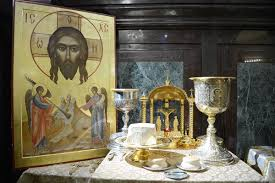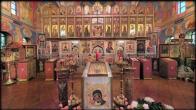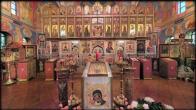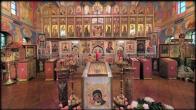You are here
Notes on the Liturgy & the Church

by Sergei Fudel
Chapter One
Christianity found its permanent religious structure in the Mystical Supper, and one could say that Christianity is the Mystical Supper. The Mystery - all Christianity, the disciples gathered around their Teacher at the timeless and immortal Mystical Supper: "Taste of the Heavenly Bread and the Cup of Life, and see that the Lord is good." He, at the center, offering Himself up to Crucifixion. During the Supper, already heralding that Crucifixion by offering up His Body and Blood for the incomprehensible, supernatural nourishment of the faithful: "Take, eat, this is My Body." The narrow path onto which Christ led mankind after that night is so clearly beyond sinful mankind's natural inclination and ability, that of necessity, the opening of that path began with supernatural support.
However, it also stands as both the goal, and the culmination and accomplishment of the goal: "That ye may eat and drink at My table in My Kingdom." (Luke 22: 30). Communing of the Divine World, entry [into that World] by overcoming nature in human, already transfigured and deified Eternal life, is the both the way to and the goal of Christianity. The reality of such entry here on earth, entry into a world that already is not merely earthly, the reality of man's rebirth, has always frightened people.
"Whosoever eateth My Flesh and drinketh My Blood dwelleth in Me and I in him."... On hearing that, many of His disciples said: "This is an hard saying; who can hear it?" "From that time many of his disciples went back, and walked no more with him. Then said Jesus unto the twelve: 'Will ye also go away?'" (John 6: 56, 60, 66, 67)
Here is the test of faith and love, and not only of faith, and a test not only for the Apostles, but for all of us. "Then Simon Peter answered Him, Lord, to whom shall we go?" It is amazing that he began his response in that manner, and that his response was in fact so recorded for us. He could have said something quite safe, such as: "We are unlike those people of little faith; we understand everything."It is as if he began his response with "Yes, of course, we also harbor doubts, but Lord, we have no doubt in our love for Thee."[Then] Peter said, "Thou hast the words of eternal life." (John 6: 68). Perhaps it was this very point in the Gospel that was the origin for Dostoyevsky's confession of faith arose, [a confession] so fundamentally, materially erroneous and yet for many people so powerful: "If someone could prove to me that Christ is outside the truth, and if it were true that the truth were outside of Christ, then I would rather remain with Christ than with the truth."
"Lord, to whom shall we go?" Love for the person of Christ is that fiery furnace in which all doubts burn up, in which the gold of faith is purified. One can follow Christ only through loving faith, and then that faith ceases to fear what is beyond our nature, what is as yet incomprehensible, ceases to fear the invisible world, knowing that now, today, in our awful times, the Lord Jesus lives, in His human Body, in that invisible world. It is only through acquiring Him in that invisible state that we begin to understand that the life of faith is a mystery which must be accepted through love. Einstein said, "The most wonderful and profound emotion we can experience is the apprehension of wonder. In it is the fountain of all true knowledge. One to whom that emotion is foreign has lost the ability to be amazed, to stand stock-still in holy trepidation, and can be considered to be a corpse." And we know that many of us are frightened of Christian mysticism. The Mystery of Christianity lies in that a new man or a new world is established by It or in It. To not know that mystical life of Christianity is to vitiate oneself, to render oneself powerless in the face of coming dangers or great trials. And, according to the teachings of the Gospel, all human history, especially its end, is unsuccessful; it is a great mistake to train one's mind to accept the opposite, to create theocratic illusions, to draw warmth, as they do in old English novels, from the victory of virtues in history. Divine life on earth begins to celebrate its victory with Pentecost, but that victory is a hidden one, a victory to be revealed beyond the bounds of history. And to participate in that victory, one must create courageous warriors within the confines of history. Christianity is a battle, all the more terrifying in the fact that, according to the Apostle, it "is not against flesh and blood," i.e. not against people and governments, but against invisible, dark, mystical forces. While still here on earth, specifically here on earth, the Christian must enter the invisible world of Divine life; otherwise he is impotent before the world of invisible evil. He must recognize not only the full breadth, but also the full depth of Christianity, for only that will give him "the full armor of light" against the full armor of darkness. It is the Liturgy, Holy Communion, that best leads us into the Mystery of Christianity, into its Mystical Supper. St. Cyprian of Carthage, a 3rd Century bishop and martyr, wrote that it is impossible to leave undefended and without weapons those who we send into battle; they must be surrounded by the protection of the Body and Blood of Christ... they must be armed by being frankly filled to satiation with Divinity." (St. Cyprian of Carthage. To Cornelius. Works. Kiev, 1891 Book 1, pp. 283-284). We are not directed to seek after miracles.To the contrary: "This evil and adulterous generation seeks after signs." This attraction to wonders [is condemned] both in religious literature and in life. We are directed to seek not after wonders, but the Miracle, the greatest Miracle in human experience: partaking of life by partaking of the Divine Body. That Miracle takes place in the Liturgy.
PARISH LIFE
RECENT VIDEOS
Address of our Cathedral
Subscribe to our mailing list
While all the materials on this site are copyrighted, you may use them freely as long as you treat them
with respect and provide attribution on the Russian Orthodox Cathedral of St.John the Baptist of Washington DC.









